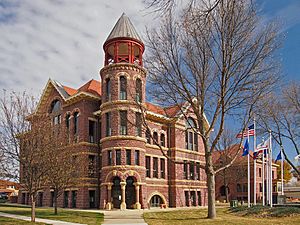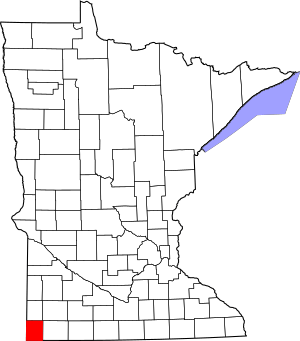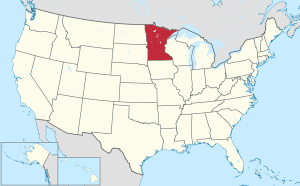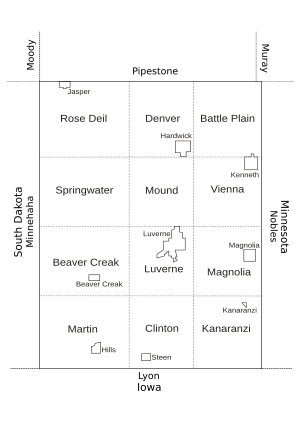Rock County, Minnesota facts for kids
Quick facts for kids
Rock County
|
|
|---|---|

Rock County Courthouse
|
|

Location within the U.S. state of Minnesota
|
|
 Minnesota's location within the U.S. |
|
| Country | |
| State | |
| Founded | May 23, 1857 (created) March 5, 1870 (organized) |
| Named for | Rock outcrop on Rock River |
| Seat | Luverne |
| Largest city | Luverne |
| Area | |
| • Total | 483 sq mi (1,250 km2) |
| • Land | 482 sq mi (1,250 km2) |
| • Water | 0.3 sq mi (0.8 km2) 0.06%% |
| Population
(2020)
|
|
| • Total | 9,704 |
| • Estimate
(2023)
|
9,551 |
| • Density | 20.1/sq mi (7.8/km2) |
| Time zone | UTC−6 (Central) |
| • Summer (DST) | UTC−5 (CDT) |
| Congressional district | 1st |
Rock County is a county in the southwestern part of Minnesota, a state in the United States. In 2020, about 9,704 people lived here. The main town and county seat (where the county government is) is Luverne. Rock County is also part of the larger Sioux Falls area.
Contents
History of Rock County
Rock County was first set up on May 23, 1857. This was done by a law from the area's government at the time. However, the county was not fully organized yet.
At first, this area was called Pipestone County. The name Rock County was actually given to what is now Pipestone County. But in 1862, the Minnesota state government changed the names. They gave the counties their current names.
On March 5, 1870, the state government passed another law. This law officially organized Rock County. It also made Luverne the county seat.
The county got its name from the Rock River. This river was named after a large, noticeable rock. This rock was called "The Rock" on a map from 1843. It is made of reddish-gray stone called quartzite. You can find it about 3 miles (4.8 km) north of Luverne. This rock stands out a lot in the flat prairie land around it. Some people also think the county was named for its rocky soil.
Geography of Rock County
Rock County is in the very southwest corner of Minnesota. Its western side borders South Dakota. Its southern side borders Iowa.
The Rock River flows south through the middle-eastern part of the county. Beaver Creek flows south through the middle-western part. The land mostly has low, rolling hills with many small streams. Most of the land in the county is used for farming.
The land gently slopes downwards toward the south. The highest point is near the middle of the northern border. It is about 1,759 feet (536 meters) above sea level. Rock County covers about 483 square miles (1,251 square kilometers). Of this, 482 square miles (1,248 square kilometers) is land. Only 0.3 square miles (0.78 square kilometers) is water. The county has a humid continental climate with hot summers.
Lakes in Rock County
Minnesota is often called the "Land of 10,000 Lakes." It has many natural lakes. However, four counties in the state do not have any natural lakes. Rock County is one of them.
Rock County did have a lake that people made. It existed from 1938 to 2014. A project called the WPA built a small dam in 1938. This dam was on Blue Mounds Creek in Blue Mounds State Park. It created a small pond.
In June 2014, heavy rain and floods damaged the dam. This caused the pond to drain away. In June 2016, the Minnesota Department of Natural Resources decided not to rebuild the dam.
Main Roads
 Interstate 90
Interstate 90 U.S. Highway 75
U.S. Highway 75 Minnesota State Highway 23
Minnesota State Highway 23 Minnesota State Highway 269
Minnesota State Highway 269 Minnesota State Highway 270
Minnesota State Highway 270
Neighboring Counties
- Pipestone County – to the north
- Murray County – to the northeast
- Nobles County – to the east
- Lyon County, Iowa – to the south
- Minnehaha County, South Dakota – to the west
- Moody County, South Dakota – to the northwest
Protected Natural Areas
Population of Rock County
| Historical population | |||
|---|---|---|---|
| Census | Pop. | %± | |
| 1860 | 23 | — | |
| 1870 | 138 | 500.0% | |
| 1880 | 3,669 | 2,558.7% | |
| 1890 | 6,817 | 85.8% | |
| 1900 | 9,668 | 41.8% | |
| 1910 | 10,222 | 5.7% | |
| 1920 | 10,965 | 7.3% | |
| 1930 | 10,962 | 0.0% | |
| 1940 | 10,933 | −0.3% | |
| 1950 | 11,278 | 3.2% | |
| 1960 | 11,864 | 5.2% | |
| 1970 | 11,346 | −4.4% | |
| 1980 | 10,703 | −5.7% | |
| 1990 | 9,806 | −8.4% | |
| 2000 | 9,721 | −0.9% | |
| 2010 | 9,687 | −0.3% | |
| 2020 | 9,704 | 0.2% | |
| 2023 (est.) | 9,551 | −1.4% | |
| U.S. Decennial Census 1790-1960 1900-1990 1990-2000 2010-2020 |
|||
The population of Rock County has changed over the years. In 1860, only 23 people lived there. By 1960, the population grew to over 11,000 people. In 2020, the census showed 9,704 people living in the county.
The people living in Rock County come from different backgrounds. Most people are White. There are also smaller groups of Black or African American, Native American, Asian, and Pacific Islander people. Some people identify as having more than one race. There is also a group of people who are Hispanic or Latino. People of Hispanic or Latino background can be of any race.
Communities in Rock County
Cities in Rock County
Unincorporated Communities
These are smaller communities that are not officially cities or towns.
Ghost Towns
These are places where towns used to be, but now very few or no people live there.
Townships
Townships are smaller local government areas within the county.
- Battle Plain Township
- Beaver Creek Township
- Clinton Township
- Denver Township
- Kanaranzi Township
- Luverne Township
- Magnolia Township
- Martin Township
- Mound Township
- Rose Dell Township
- Springwater Township
- Vienna Township
See also
 In Spanish: Condado de Rock (Minnesota) para niños
In Spanish: Condado de Rock (Minnesota) para niños
 | Charles R. Drew |
 | Benjamin Banneker |
 | Jane C. Wright |
 | Roger Arliner Young |


